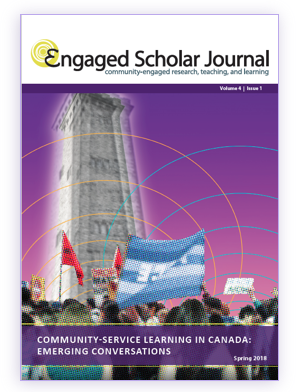Wahkohtowin as Paideia
DOI:
https://doi.org/10.15402/esj.v4i1.322Keywords:
community-based learning, legal education, praxis, IndigenizationAbstract
The Wahkohtowin class was held in Saskatoon throughout early 2014. Wahkohtowin brought together prisoners, students, and professors, in order to critically examine Canada’s “justice” system. For the author, participation in this class led to deep learning, or what ancient Greeks called Paideia. This article explores why Wahkohtowin led to deep learning. It concludes that the deep learning was attributable to four factors: the leaders created space for suffering to speak; course participants were racially, culturally, and educationally diverse; the pedagogy was relationally Socratic; and participant reflections were aimed at action, in addition to understanding. Throughout the article, Wahkohtowin is compared with the author’s experience of law school in order to highlight why law school courses rarely result in Paideia.
Downloads
Published
How to Cite
Issue
Section
License
Authors who publish with this journal agree to the following terms:
- Authors retain copyright and grant the journal right of first publication with the work simultaneously licensed under a Creative Commons Attribution License CC BY 4.0 that allows others to share the work with an acknowledgement of the work's authorship and initial publication in this journal.
- Authors are able to enter separate, additional contractual agreements for the non-exclusive distribution of the journal's published version of the work (e.g., post it to an institutional repository or publish it in a book), with an acknowledgement of its initial publication in this journal.
- Authors are permitted to post their work online (e.g., in an institutional repository or on their website) after the publication of their work in the Engaged Scholar Journal.
- Please note that while every opportunity will be taken to ensure author participation in the editing process, due to time constraints final copyediting changes may be made before publication to ensure APA adherence throughout all submissions.




